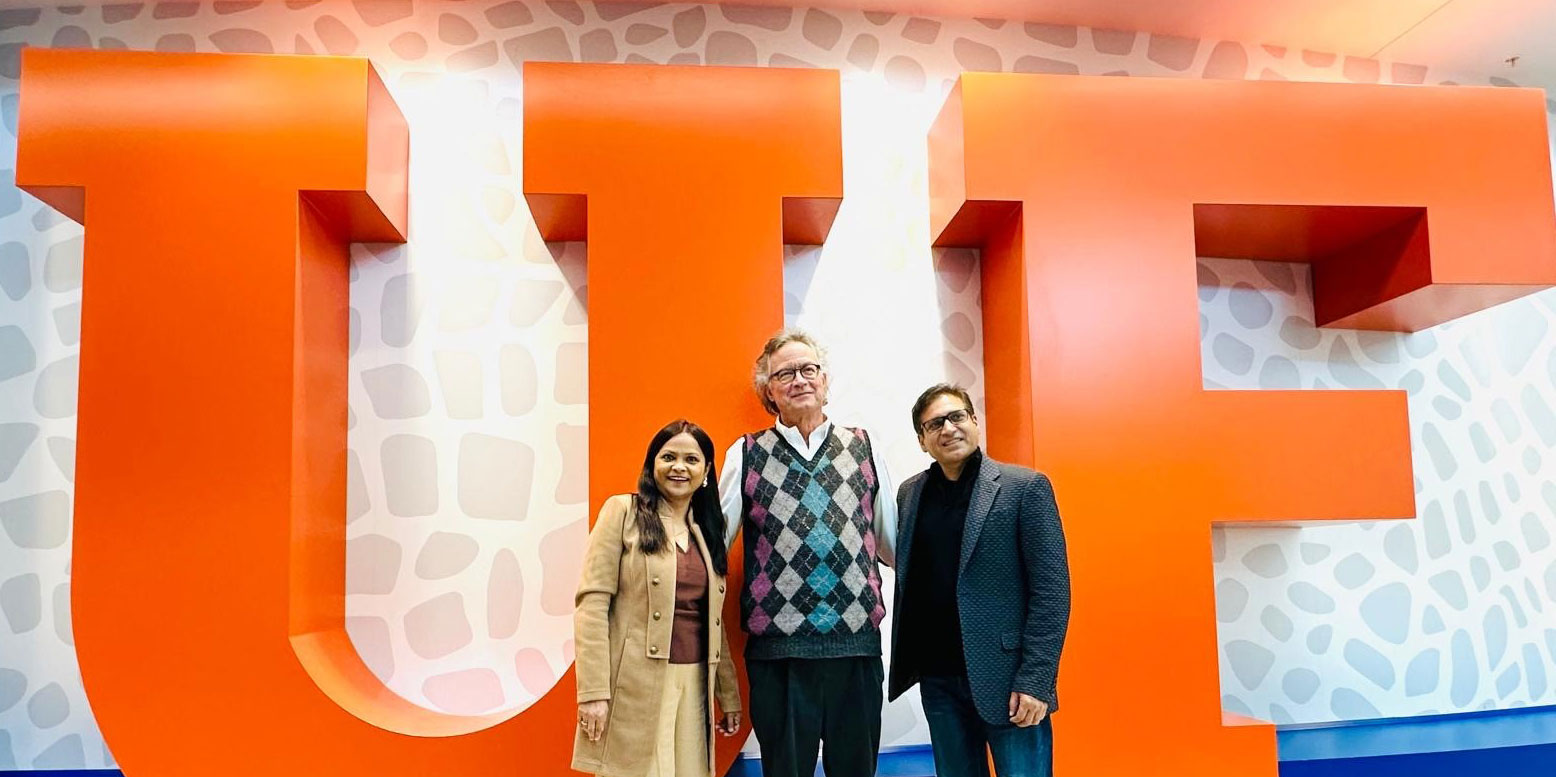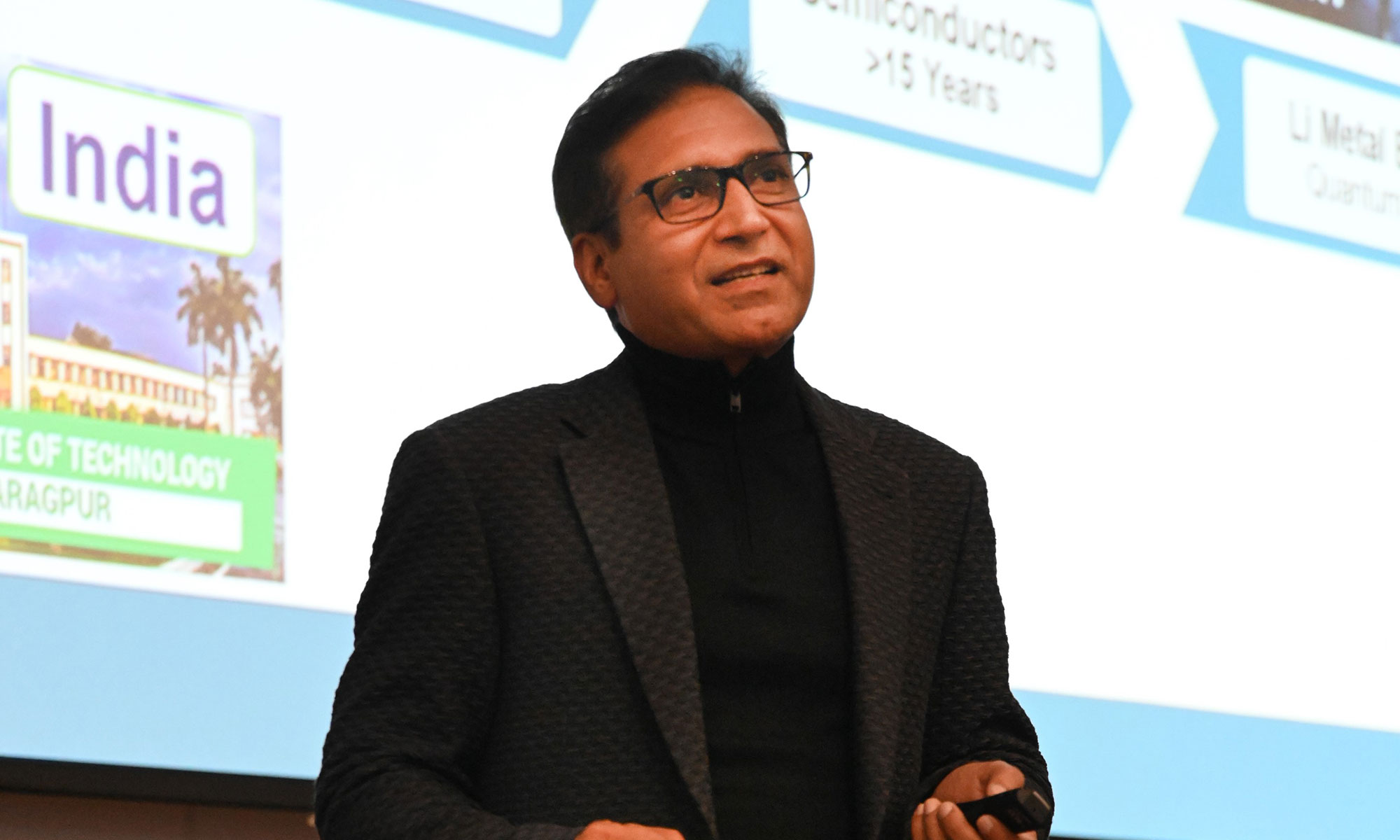By Ada Lang
Sunil Roy’s journey started in India, wound through Gainesville and, for now, landed him in Silicon Valley. He came back to UF in January and spoke to students about those years, and more specifically, his experiences at the University of Florida.
He began his college education studying at the Indian Institute of Technology, also known as IIT Kharagpur, a research university in Kharagpur, West Bengal, India. He then applied to UF’s Department of Chemical Engineering and completed his master’s and doctoral degrees within four years.
Under the guidance of Mark Orazem, Ph.D., a distinguished professor, he focused on electrochemical engineering and conducted research on fuel cells and batteries — technologies at the forefront of clean energy.
“Completing my Ph.D. and M.S. within four years not only accelerated my technical growth but also fostered a growth mindset — one that continues to drive me in pursuing new ventures with confidence and resilience. It was also an immensely fulfilling experience,” Roy explained.
“UF ChemE instilled the value of embracing new challenges with curiosity and determination,” he added.
After graduating 17 years ago, Roy began his career at Intel, which gave him a solid foundation in semiconductor technology across five cutting-edge technology nodes.
“This experience built my foundation in process technology development, equipment design and zero-defect manufacturing,” he said.
Over the years, he held key roles at Intel, Philips Lumileds and Applied Materials. In 2023, he transitioned into a leadership role at QuantumScape, allowing him to translate his research on hydrogen fuel cells and lithium batteries into commercial innovation.
Passionate about team development, Roy was elected chair of the American Society for Quality (ASQ) Silicon Valley section and has mentored more than 50 engineers toward ASQ certifications and increased engagement among 2,000+ professional members.
Roy shared some additional thoughts about his time at UF.

What professors, courses or programs had a significant impact on your education?
My journey at UF was profoundly shaped by the mentorship of my advisor, Mark Orazem. His guidance, combined with the rigorous coursework in Electrochemical Systems and Impedance Spectroscopy, equipped me to address industrial challenges effectively. My co-advisors, Professor Eric Wachsman and Professor Helena Weaver, helped me expand my learning in Material Characterization and Catalysis, providing a comprehensive technical foundation.
What was your favorite part of your time at UF?
My time at UF and the ChemE department provided a strong foundation in Electrochemical Engineering, particularly through hands-on expertise in Impedance Spectroscopy. Conducting research in fuel cells allowed me to bridge fundamental principles with real-world energy challenges, deepening both my theoretical and practical understanding.
What are the most important lessons you learned
The rigorous research environment at UF honed my ability to navigate complexity, think critically and push beyond conventional boundaries — skills that remain integral to my professional journey. Most importantly, my experience reinforced a key lesson: Success in unfamiliar domains is driven by discipline, perseverance and a strong work ethic.
How did your experience here influence your personal and professional life?
The curriculum and research fostered a deep sense of confidence and instilled a growth mindset, which continues to guide me in new ventures. It also broadened my perspective on global diversity, reinforced a lifelong pursuit of knowledge and deepened my appreciation for clean technology. This journey not only shaped my expertise but also instilled a commitment to advancing sustainable solutions on a global scale.
How did your UF experience influence your approach to problem-solving and innovation?
My research approach was deep and linear, providing a strong foundation for my professional career. However, industry challenges require rapid problem-solving to address immediate customer needs and multiple stakeholder interests. Incremental progress is valued, and swift iteration is critical.
How did your experience here help you develop valuable skills?
I was privileged to have Professor Orazem as my advisor, whose mentorship and international affiliations provided invaluable exposure to the Electrochemical Society (ECS). Attending multiple ECS conferences deepened my understanding of cutting-edge electrochemical advancements and facilitated networking with industry and academic leaders.
As the first president of the UF ECS chapter, I had the opportunity to develop leadership skills, organize events and build meaningful connections, which were pivotal in shaping my academic and career trajectory.
What advice would you give students pursuing a career in ChemE?
Chemical engineering provides a strong foundation in core competencies that are highly sought after across industries, particularly in process development and technology innovation. A degree from UF is a powerful credential that will open doors throughout your career.
What are some of the most valuable takeaways you’ve learned since graduating?
One key insight stands out: The complexity of challenges and the number of people involved grow exponentially over time. Success lies in rapidly iterating toward optimal solutions while aligning teams toward a shared vision.
My experience at UF’s Chemical Engineering department instilled the confidence to navigate uncertainty, develop expertise in new fields and cultivate a growth mindset. Passion—excelling in the present while staying connected to a larger purpose—drives progress, and conviction sustains it. With discipline and adaptability, we propel ourselves toward excellence.

